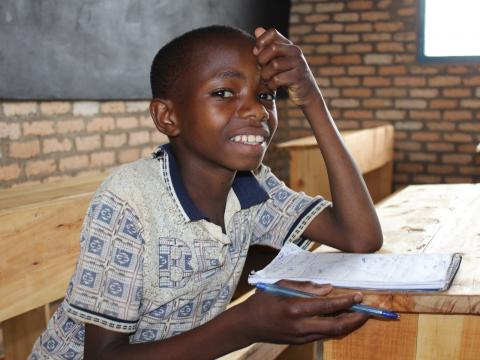Before and after, what does education look like in Burundi?

Mames Nizigiyimana is a ten-year-old school boy living at Gatete Hill in the eastern province of Burundi. His morning routine is simple: gets up early, fetches water nearby, has breakfast, and then goes to school. His school is in the neighbourhood, on the top of Gatete hill.
But not that long ago – about two years ago – his routine was different. It would involve walking for hours to get to school. And if things improved 2 years ago, now they are even better. Thanks to World Vision Burundi and its partners, the old, overcrowded, dark school – including 2 small classrooms – was replaced by a new building, with six brand new classrooms. It stands tall on top of the hill, next to the old school building, its large, bright presence a clear mark of the progress.
In Burundi, schooling is mandatory for children ages 7-13. However due to over a decade long civil war that ravaged Burundi, many schools have been destroyed. The war plunged also communities in poverty, preventing them from participating in their own development, like building new schools, health centres, investing in infrastructure. In 2007, the government of Burundi decided to make primary education mandatory for all. The response was positive, and overwhelming. Enrolment in first grade went up to 130%. But whilst free and mandatory primary education are laudable, many regions still struggle to accommodate all the eager students. There are just not enough schools. In many areas like Cankuzo where Mames lives, the lack of schools force children to walk several miles each day– up to six hours to and from the closest school building.
Mames explains that before the new school was built, children were spending much of their time going and coming back from school. It was very difficult for many of them, especially kids from poor families. There was just not enough food for them in the morning to eat, and had no energy to study, let alone walk for a long time. Severin Buzingo, Minister of Primary and Secondary Education, who grew up in that area, attested at the school opening ceremony that many children of Gatete Hill were not attending school because of the long distances. ‘I also had to walk for 30 miles a day to go to school when still in primary school, going hungry and sometimes sick because of tiredness. It’s obvious that many children were forced to stay home because of lack of schools here on this hill. The proof is that more than five years ago when community members built two classrooms here, only around 100 children attended this school, but with the opening of this new school, over 250 children joined; where were they before? At home. Thanks to World Vision and the donor, now they can study,' he said.
Mames walked in front of the joyous crowd at the opening, and quietly but eloquently said that he would dedicate his mind and time to study now that they no longer have to deal with the tyranny of distance. 'To the people who contributed to this school, we have nothing to say but thank you. When we were still studying in the old school, we got cold when it rained. We were afraid it would fall on us. It happened in other old schools like this one, and children died. Now we have no worries and we will study well. Thank you,' said Mames.
The community’s commitment to the development of their children was greatly appreciated by World Vision. 'Gatete primary school is a great example of what partnerships can achieve. The community gathered the locally available materials, the commune brought desks, the donor provided the funding, and World Vision acted as a catalyst, overseeing the project. The cooperation, hard work and enthusiasm of the community prove that the people of Cankuzo are capable, are development oriented, and care about the future of their children. Investing in education is the investment with the greatest returns,' said World Vision Burundi Interim Program Director.
'Don’t think that we do not know the importance of schooling for our children, but we didn’t have schools. Look at that old school we had! It had two classrooms only. How do you want all the children of this hill to find a place in two rooms?' explains Marthe Kabunduguru, 55-year-old mother, one of the many joyous mothers gathered at the opening ceremony. 'We stay in poverty because our parents kept us home; they only wanted us in the field.We cannot do the same to our children if we want them to face today’s life.Without getting an education, it’s difficult to live a decent life; now that this school is here we can’t act as our parents,' said mother of four Marthe.
Mames smiles. He wants to be a doctor, he says shyly. The mothers nod, smiling back. It is all possible.